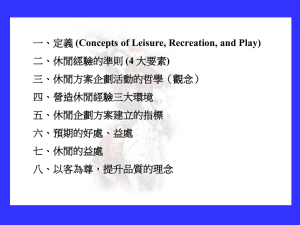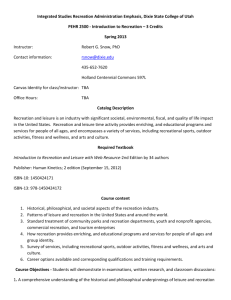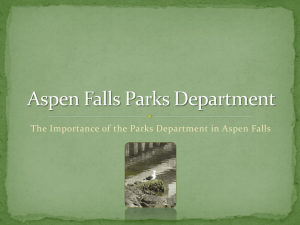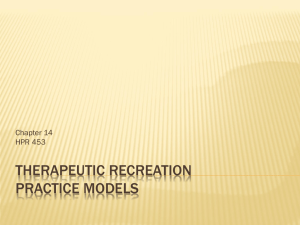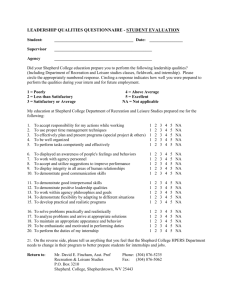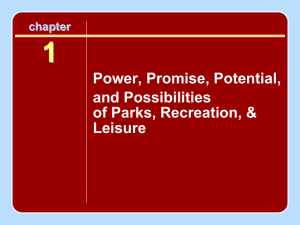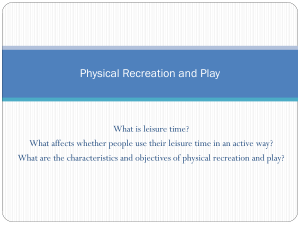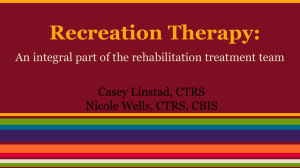PEHR 3310 Syllabus - Dixie State University
advertisement
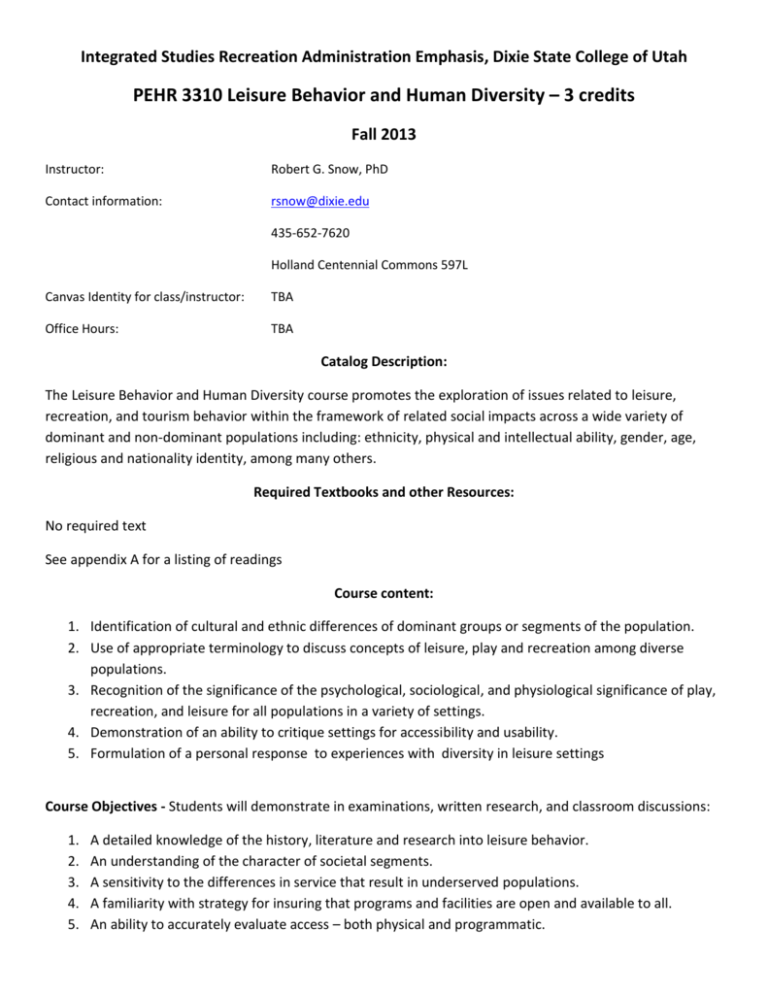
Integrated Studies Recreation Administration Emphasis, Dixie State College of Utah PEHR 3310 Leisure Behavior and Human Diversity – 3 credits Fall 2013 Instructor: Robert G. Snow, PhD Contact information: rsnow@dixie.edu 435-652-7620 Holland Centennial Commons 597L Canvas Identity for class/instructor: TBA Office Hours: TBA Catalog Description: The Leisure Behavior and Human Diversity course promotes the exploration of issues related to leisure, recreation, and tourism behavior within the framework of related social impacts across a wide variety of dominant and non-dominant populations including: ethnicity, physical and intellectual ability, gender, age, religious and nationality identity, among many others. Required Textbooks and other Resources: No required text See appendix A for a listing of readings Course content: 1. Identification of cultural and ethnic differences of dominant groups or segments of the population. 2. Use of appropriate terminology to discuss concepts of leisure, play and recreation among diverse populations. 3. Recognition of the significance of the psychological, sociological, and physiological significance of play, recreation, and leisure for all populations in a variety of settings. 4. Demonstration of an ability to critique settings for accessibility and usability. 5. Formulation of a personal response to experiences with diversity in leisure settings Course Objectives - Students will demonstrate in examinations, written research, and classroom discussions: 1. 2. 3. 4. 5. A detailed knowledge of the history, literature and research into leisure behavior. An understanding of the character of societal segments. A sensitivity to the differences in service that result in underserved populations. A familiarity with strategy for insuring that programs and facilities are open and available to all. An ability to accurately evaluate access – both physical and programmatic. Campus & Classroom Policies and Expectations (Please, go read all the linked information, you are responsible to know what it contains.) Academic integrity: I believe that most students are honest, However, I will not tolerate cheating. Repeated or aggravated offenses will result in failing the course. Any time you take credit for work you did not do, you are cheating. This includes getting the answers to homework problems from someone else, copying information from a library or internet source and presenting it as if it were your own words (plagiarism), looking at someone else's answers on an exam, and asking someone who has already taken a test or quiz about what questions it contains. (See “Student Code” http://www.dixie.edu/humanres/policy/sec5/533.html#appeals). There is no such thing as an excused absence for this class. You are adults, and I expect you in class or active in any coordinated group activity (even if on-line). If you are not there I assume you have a good reason. You don’t need to tell me what that reason is. However, I expect that students will take the initiative and make up work they missed and do additional work (usually instructor prior negotiated/approved extra research and writing directly related to the missed topical information) to compensate for the missed opportunities as appropriate. I take roll for normal classes and group visitations to off campus sites. In summary: when any student misses class for any reason, that student is responsible for the material that was covered in that session and is given a reasonable opportunity to recover any points. College approved absences: If you anticipate being absent from class because of a college-sponsored activity (athletic events, club activities, field trips for other classes, etc.) Please read this information and follow the instructions carefully. The policy can be found at: http://www.dixie.edu/humanres/policy/sec5/523.html In summary: when any student misses class for any reason, that student is responsible for the material that was covered in that session and is given a reasonable opportunity to recover any points. I reserve the right to disallow the participation of any class member(s) at any time in response to a situation that in my judgment creates a possible safety issue, or inappropriate/counterproductive/disruptive conflict (particularly those I consider particularly flagrant or repeated). Should such measures become necessary, the student(s) involved will be required to immediately leave the classroom and perhaps campus as well but will be responsible to arrange to meet with me within 2 school days (48 hours) to resolve any outstanding issues or questions. We will work together to produce a brief document that details an agreement on how we agree to move ahead. For more details, please see the disruptive behavior policy at: http://www.dixie.edu/humanres/policy/sec3/334.html I expect you to come to class before it is time to start and to stay for the entire period. It is also expected that you remain attentive and actively participate in the various opportunities. I will try very hard to start class on time. Class members should to be ready at the scheduled time and know that I consider routine lateness to be sign of troubling disregard to the rest of the class and to me. Another thing that I object to is cell phones that ring during class (I rather think I don’t need to say much about people who carry on publically loud phone conversations in any public place) . Please turn them off or if you are expecting an emergency call, set them to vibrate only and immediately find somewhere quiet to answer if you absolutely must. The use of computers or tablets or phones to do things unconnected with our discussion during class indicates to me that you have checked out, as does sleeping. While food and drink are not absolutely prohibited (and drink is more accepted than food) it needs to be discreet or even invisible. It might be useful to say simply that “I expect to treat you all with respect and demand nothing less from you.” Resources & Information of General Interest Dmail: Important class and college information will be sent to your Dmail account. This information includes your DSC bill, financial aid/scholarship notices, notification of dropped classes, reminders of important dates and events, and other information critical to your success in this class and at DSC. All DSC students are automatically assigned a Dmail account. If you don't know your user name and password, go to www.dixie.edu and select “Dmail,” for complete instructions. You will be held responsible for information sent to your Dmail email, so please check it often. We will be using the DSC Campus Canvas capability to coordinate our activity and to act as a hub of informational interconnection. Disability Accommodations: Dixie State College is committed to a policy of cheerfully providing reasonable accommodation to any student with a situation or condition that might otherwise constrain full participation. Students with medical, psychological, learning or other disabilities desiring reasonable academic adjustment, accommodations, or auxiliary aids to be successful in this class will need to contact the DISABILITY RESOURCE CENTER Coordinator (Baako Wahabu) for eligibility determination. Proper documentation of impairment is required in order to receive services or accommodations. DRC is located in the North Plaza Building. Visit or call 652-7516 to schedule appointment to discuss the process. DRC Coordinator determines eligibility for and authorizes the provision of services and then works with directly with the instructor to devise appropriate strategies. College Resources: Several college resources are available to help you succeed. Check out the links for each one to get more information. – Note: You should already be (or get) in the habit of using all these resources for ALL of your classes. If you need help understanding the content of these courses, you will probably be able to receive assistance by going to the Tutoring Center located on the 4th floor of the Holland Centennial Commons in Room 431. You can visit them online at http://dsc.dixie.edu/tutoring/ If you need help writing papers, go to the Writing Center on the fourth floor of the Holland Centennial Commons in room 421. You can also visit them online at http://new.dixie.edu/english/dsc_writing_center.php If you need to use a computer to do schoolwork on campus, go to the Computer Center in the Smith Computer Center or the workstations located in the new Holland Bldg. Library. If you are assigned to take a test in the Testing Center, go to the North Plaza. You can get information on their website at http://new.dixie.edu/testing/ The Library has all kinds of information and resources. Visit the Dixie State College Library on the 2 nd, and 3rd floors of the Holland Centennial Commons, or go to the library website at http://library.dixie.edu/ Grading and Evaluative Process: Grading for this course is accomplished by adding together the number of points accumulated by the student in each category of activity, dividing that number by the points possible to derive a percentage and then using the below detailed departmental grading rubric. Reasonably up-to-date grades will be routinely available to individual in Canvas. I do not paper post any grades, but will routinely return written work with comments. 1 2 3 5 6 7 Grade Components Participation -5 points, each roll appearance 210 Student initiated limited scope case studies 40 points each - 4 total Volunteer Service &/or data gathering effort directly relating to underserved local populations, and summary analysis of findings. Weekly quizzes – Ten at 10 points each – administered in Canvas Midterm Exam Final Exam **In accordance with DSC and Departmental Policy, the Final Exam will be administered ONLY during the Final Exam period, plan ahead! Grand Total 160 120 100 100 150 960 The filename for any file you turn in as part of homework MUST include your name as well as a descriptor. Canvas will help with many of these requirements and we will need to make sure everyone has the ability to easily produce PDF documents. Late Assignment penalty of 5% /school day. If you should get into grade related trouble it is possible to perform extra credit but prior approval MUST be negotiated (This means that you have to get prior WRITTEN – email works too) approval from the instructor)). Extra credit possibilities include research and writing on a related topic, a submitted article (ersatz ok), or something similar. An essential part of the proposal will be the date of completion. We will be using the mandated FCS/PEHR Departmental grading scale: FCS/PEHR Grade Scale A = 95%-100% B+ = 88-90% C+ = 78-80% D+ = 68-70% A- = 91%-94 % B = 84-87% C = 74-77% D = 64-67% B- = 81-83% C- = 71-73% D- = 61-63% Week/Assignment/Activity Week 1 2 Activity Introductions, review of class requirements, review of program requirements Walking the walk and talking the talk – diversity – local populations Q Q 3 4 5 6 7 8 9 10 11 12 13 14 15 /parameters/ recognition Accommodation without condescension – effective communications Discrimination and how to avoid separate but equal strategies Case studies seminars and individual analysis Resources of potential in planning for diversity sensitive leisure services Review and preparation for exam Field experiences – data gathering &/or volunteer work Barrier identification and mitigation Impact of the law Case Studies seminar and individual analysis Analyzing the gathered data and producing a strategies/recommendations document Implications for professional education and training. Future trends Lessons Learned: Review and Preparation for Final Q CS Q Q CS Midterm Q CS Q Q CS Q Q Final Exam (Of course, the calendar that is inserted here will be updated to the appropriately current version!) Appendix A – Readings In addition to these works, we will make a vigorous effort to use current news as a source for this course. Books: • Kelly, J. (1983). Leisure Identities & Intera ctions , London : George Allen & Unwin. • McLean, D., Hurd, A., & Rogers, N. (2004). Kraus’ Recreation and Lei sure in Modern Society (7 th Ed). Boston: Jones & Bartlett Publishers. • Pieper, J. (1963). Leisure: The Basis for Culture. New York: Mentor Omega Books. • Robinson, J.P., Godbey, G. (1997). Time for life; The Surprising ways Americans use their time. College Park , PA : Pennsylvania State University Press. • Rosenblum, K. E. & Travis, T. M. C. (2006). The Meaning of Diff rence: American constructions of race, sexual and gender, social class, and sexual orientation (4 t h ed.). San Francisco: McGraw-Hill. Articles: • Auster, C. J. (2002). Transcending potential antecedent leisure constraints: the case of women motorcycle operators. Journal of Leisure Research, 33, 272-298. • Bedini, L.A. (1993). Transition and integration in leisure for people with disabilities. Parks & Recreation, 28(11), 20 24. • Boyd, R., and Tedrick, T. (1992). Aging adults and mental retardation and leisure. Parks & Recreation, 27(10), 20 -27, 86. • Children Now (2001). Fair Play: Violence, Gender and Race in Video Games. (Research Report) Oakland, CA. (36 pages) • Dwyer, J.F., & Gobster, P.H. (1992). Recreation opportunity and cultural diversity. Parks & Recreation, 27(9), 22-32, 128. • Hartel, J., Stebbins, R.A., Fulton, C., Chang, S. & Case, D. (November 6, 2006). Taking Leisure Seriously: Information Realities in Leisure Ti me. A Panel Discussion at the Annual Meeting of the American Society for Information Science & Technology. Austin, TX. • Henderson, K.A. (1997). Diversity, differences, and leisure services - promoting acceptance of diversity in park and recreation programs. Parks & Recreati on, 32(41 -46) • Henderson, K.A., Bedini, L.A., Hecht, L, & Schuler, R. (1995). Women with physical disabilities and the negotiation of leisure constraints. Leisure Studies, 14 , 17 -31. • Henderson, K.A., & Bialeschki, D. (1993a). Exploring an expanded model of women’s leisure constraints. Journal of Applied Recreation Research, 18 , 229-252. • Henderson, K.A., & Bialeschki, D. (1993b). Negotiating constraints to women’s physical recreation. Loisir et Societe, 16, 389-412. • Jackson, E.L. (2005). Constraints to Leisure. State College, PA: Venture. • Kuntsler, R. (1993). Serving the homeless through recreation programs. Parks & Recreation , 28(8), 16 -22, 73. • Little, D. (2002). Wom en and adventure recreation” Reconstructing leisure constraints and adventure experiences to negotiate continuing participation. Journal of Leisure Research, 34, 157-177. • Livengood, J. S., & Stodolska, M. (2004). The effects of discrimination and constraints negotiation on leisure behavior of American Muslims in post September 11 America .Journal of Leisure Research, 36 (2), 183 – 208. • Lord, M.A. (1997). Leisure 's role in enhanci ng social competencies of individuals with developmental disabilities. Parks & Recreation, 32(35-40) • Pearce, K.D. (1995). Street kids need us t oo: Special characteristics of homeless youth. Parks & Recreation, 30(12), 16-22 • PEW / Internet and American Life Project. (2005, August 5). Internet Activities. Retrieved August 15, 2005, from http://www.pewinternet.org/trends/Internet_Activities_8.05.05.htm • Roberts, N.S. (1995). Wilderness therapy for women. Parks & Recreation, 30(5), 26-31. Seigenthaler, K.L. (1996). Leisure and the elderly. Parks & Recreation, 31 (1), 18 -24. • S mith, R. W. (1993). Sport and physical activity for people with disabilities. Parks & Recreation, 28(2) , 21 -27, 96, • Suren, A., and Stiefvater, R. (1995). On the path to solving at -risk behavior a mong youth. Parks & Recreati on, 30(8), 14-22. • Yakel, E. (2004) Seeking information, seeking connections, seeking meaning: Genealogists and family historians . Information Research , 10 (1) paper 205 [Available at http://InformationR.net/ir/10-1/ pa per205.html ] (Thanks to: Dr. Ralston, University of Utah)

